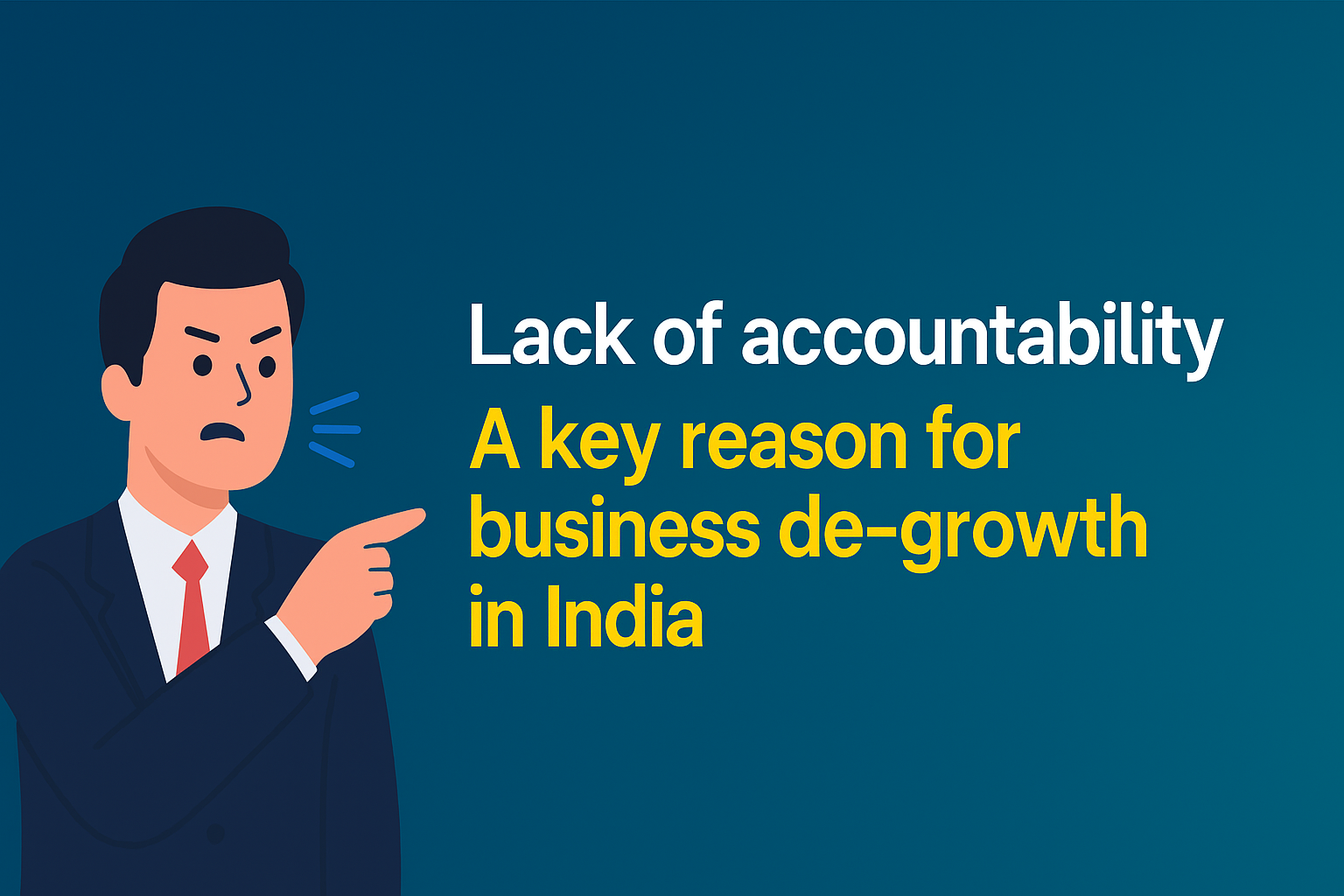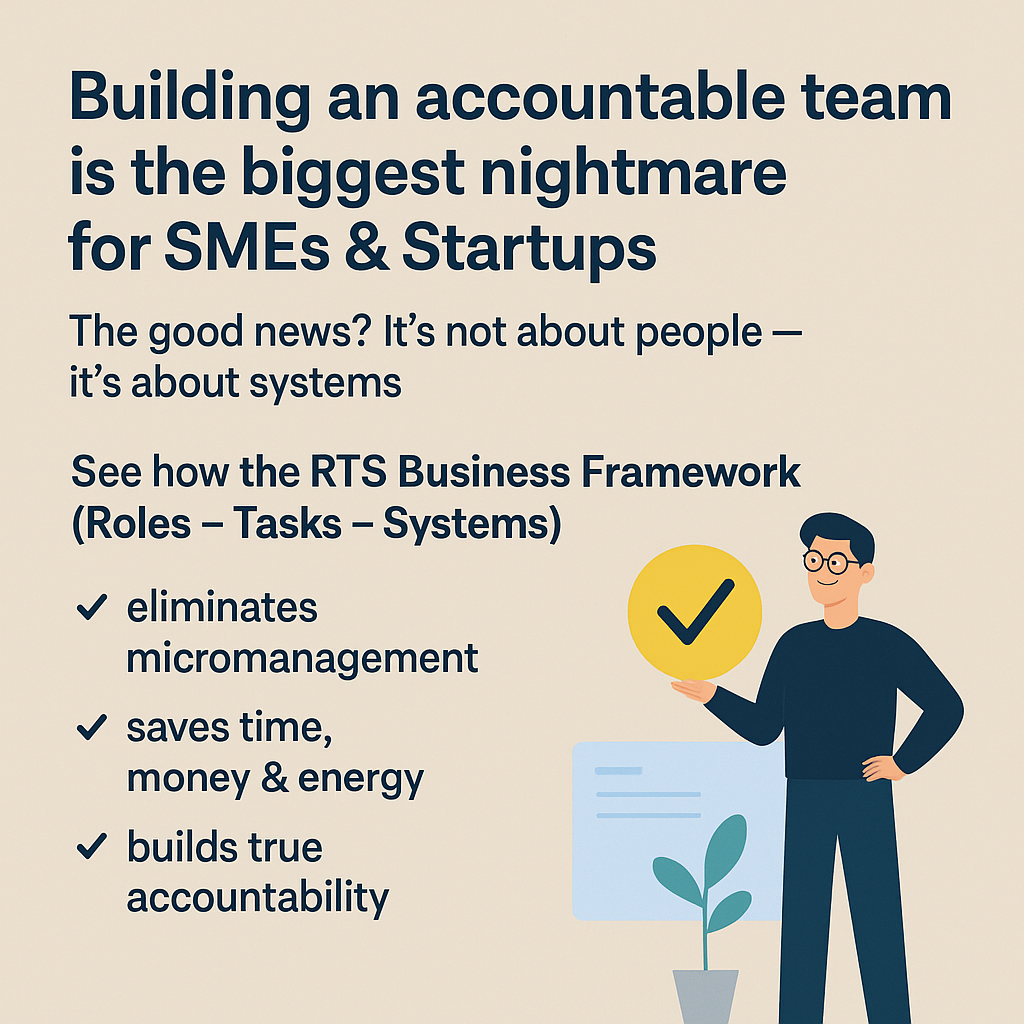In today’s evolving business ecosystem, Indian startups and SMEs are pushing boundaries with innovation, new-age marketing, and digital transformation. Yet, despite the technology leap and talent availability, many businesses still struggle with stagnation—or worse—de-growth.
What’s going wrong?
While market conditions, funding challenges, and competition are often blamed, one silent killer continues to drain performance and potential: Lack of accountability within teams.
Understanding the Accountability Crisis
Accountability isn’t just a management buzzword—it’s the foundation of a high-performing business.
When team members don’t feel a sense of ownership over their tasks, goals, or results, it leads to:
✔️Missed deadlines and delayed projects
✔️Poor customer service and lost opportunities
✔️Low motivation and team conflicts
✔️Lack of responsibility in decision-making
✔️A culture of excuses over execution
The result is clear >>> growth slows down, customers leave, and profitability suffers.
Why Is Accountability Lacking in Indian Businesses?
1. Absence of Systems to Track Responsibility
Many SMEs still run operations via spreadsheets, WhatsApp, or verbal instructions. Without centralized platforms to assign, track, and review tasks, it's easy for accountability to fall through the cracks.
2. No Defined KPIs or Ownership Roles
Often, employees wear multiple hats without clarity on who owns what. This leads to confusion, overlap, or even task avoidance.
3. Fear-Driven Culture
In some workplaces, fear of blame leads to silence rather than ownership. Employees prefer to “stay safe” instead of stepping up.
4. Lack of Leadership Training
Not every entrepreneur or manager has the tools to cultivate a culture of accountability. This trickles down across the hierarchy.
How Lack of Accountability Affects Growth >>> Let’s take a practical example.
Imagine a service company where a lead comes in. It goes to a salesperson, but there’s no system to track follow-ups. The salesperson gets busy, forgets, or assumes someone else called. The lead goes cold.
Multiply this scenario by 10, 100, or 1,000, and you’ll see how leads slip, customers churn, tasks get delayed, and management remains unaware until it’s too late.
Building a Culture of Accountability
So how can startups and SMEs fix this?
✅ Step 1: Introduce a Centralized Task Management System
Use tools like Borg Desk Workplace ERP to assign, monitor, and automate tasks across sales, service, operations, and finance.
With features like:
✔️Task Delegation & Tracking
✔️Automated Reminders & Escalations
✔️Time & Productivity Logs
✔️Transparent User Access Roles
…every team member knows what they’re responsible for.
✅ Step 2: Set Clear KPIs and Outcomes
Each role should have clear, measurable goals. Weekly reviews and feedback loops keep people on track and aligned.
✅ Step 3: Train Leaders to Encourage Ownership
Move from micromanagement to a culture of responsibility. Empower your team to take initiative, make decisions, and feel proud of their wins.
✅ Step 4: Recognize and Reward Accountability
When employees go above and beyond, celebrate it. Recognition fuels repetition.
Borg Desk Workplace ERP: Driving Ownership, Task Completion & Growth
Borg Desk is built specifically to help Indian businesses automate operations and instill accountability at every level.
✔️Leads are auto-assigned and tracked
✔️Projects and tasks are monitored real-time
✔️Notifications and reminders keep everyone alert
✔️Managers get insights into who’s doing what—and what’s pending
In the race for business growth, your team is your biggest asset—or your weakest link. When people don’t own their work, your business pays the price.
But when you foster a culture of accountability—supported by the right systems like Borg Desk ERP—you unlock a new era of clarity, consistency, and growth.
The future belongs to businesses that take ownership—top to bottom.



.png)

No comments found
Post your comment